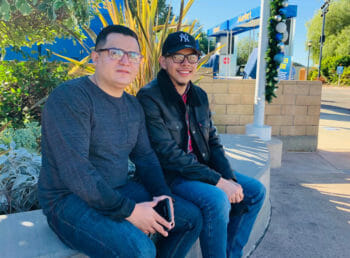ABHMS awards grant to organization that helps asylum seekers

Jonathan Rayo (left) with Kevin Zeledon, both of whom won their asylum cases in 2020.
Jonathan Rayo of Nicaragua was an asylum seeker whose story has a happy ending, thanks to “We Care”—an organization that aids immigrants to the United States—and the grants that the organization received from ABHMS.
Along with thousands of students, Rayo participated in political rallies to protest the corruption of the Nicaraguan communist government. Paramilitary forces chased him, and he hid. A few days later, he was headed home when he saw soldiers at his house. His mother called his mobile phone to tell him to leave the country. In December 2019, he arrived at the Tijuana-San Diego border. Because of changes in asylum policies, he was returned to Tijuana to apply from there and await his case. At the beginning of 2020, he contacted We Care, which took his case.
We Care was able to pay part of his legal fees and found other organizations to pay the rest. We Care won Rayo’s case, and he was released around March 2020. We Care connected him with other asylum seekers, and they were able to rent an apartment. Rayo is now working and residing safely in the United States.
In 2020, ABHMS provided We Care with a $15,000 grant for the support of asylum seekers coming from Nicaragua, Venezuela, Honduras and El Salvador. Part of the funds We Care received were from One Great Hour of Sharing funds for Refugees and Immigration. The money was used as follows:
- $7,500 in legal fees to help three asylum seekers;
- $500 for clothing and food when they are released;
- $350 for calling cards to asylum seekers in detention centers;
- $250 for land transportation from detention centers to homes;
- $350 airplane ticket; and
- $5,550 in bonds.
We Care is a ministry of First Baptist Church of Maywood, Calif. It is run by the church’s pastor, The Rev. Dr. Melvin Valiente, and his wife, Pastor Ada Valiente, who meets with Rayo and other refugees from Nicaragua to mentor them and to follow up regarding their adaptation to the United States.

